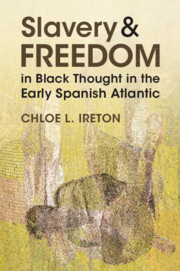‘This book is an astounding, sweeping, and beautifully written intellectual exploration of the rich, complicated, and worldly lives of people of African descent as they negotiated experiences of enslavement and emancipation in the early modern Iberian Atlantic. It charts an extraordinary intellectual cartography of early modern Black living that upends how scholars think of Black movement and agency at the dawn of and decades into the Atlantic slave trade.’
Yesenia Barragan - Rutgers University
‘Ireton guides the reader through the early-modern archive pointing to sources that bring into focus themes long held to be unimaginable. The narrative before us is a testament to archival presence engendered by the thoughts and actions of enslaved Africans and their early-modern descendants. She charts new ground in this brilliant study of slavery and freedom.’
Herman Bennett - author of African Kings and Black Slaves: Sovereignty and Dispossession in the Early Modern Atlantic
‘If there was ever a body of early modern Hispanic Black Atlantic thought, as the archive of ideas on freedom, rights, and livelihood, Ireton provides its fullest account through the examination of the lives and thoughts of myriads of Black people born in Africa, Europe, and the Americas. Behind the letters, trials, and petitions examined in this book, readers can piece together the lives of these Black men and women both in metropolitan Spain and the colonies, in tandem, as never before.’
Alex Borucki - University of California, Irvine
‘In her masterful exploration of a ‘lettered Black public sphere’ in the Spanish Atlantic, Ireton traces how Black subjects mobilized a transatlantic web of information to enact freedom. Her subjects gossip, litigate, acquire wealth, and theorize freedom as they circulate, spreading knowledge in surprising ways. Beautifully written, deeply researched, and centered in life stories, Ireton provocatively expands upon our knowledge of freedom and unfreedom.’
Karen Graubart - author of Republics of Difference: Religious and Racial Self-Governance in the Spanish Atlantic World
‘This book is a marvel of methodological inventiveness and scholarly rigor. Drawing on expansive archival material, Ireton grounds readers in the ‘thick spheres of communication’ that enslaved and free people of African descent engaged in to shape ideas and debates about slavery and freedom across the Spanish empire.’
Tamara Walker - author of Exquisite Slaves: Race, Clothing and Status in Colonial Lima
‘Extensively researched and creatively argued, this groundbreaking study is replete with richly detailed vignettes featuring the voices of Africans and people of African descent in sixteenth-century Seville and Spanish America. Ireton reminds us of Black individuals’ agency and dynamism within the early modern Iberian world, mustering a wealth of new evidence to document their multiform efforts to safeguard their liberties and loved ones.’
David Wheat - author of Atlantic Africa and the Spanish Caribbean, 1570–1640


